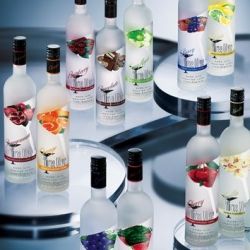Brews You Can Use
A fitting Memorial today: St. Benedict, the man who gave us monasteries, who in turn gave us beer and many other forms of alcohol.
The Liturgy of the Hours this morning contains a reading from St. Benedict's rule. One line says that there exists a "bitter spirit" that divides us from God and leads to hell. I assume he's not referring to a strong type of beer.
In honor of the great man, I offer an extended BYCU this morning.
__________
Forbes special report about drinking. It's full of articles. I haven't even clicked on all of them yet, much less read them. There's a lot. Did you know the tiki bar drinks are making a comeback? Need a PSA about alcoholism. Go here ("If you suspect that you have a drinking problem, you probably do"). Go here to learn the story behind famous brands. Fascinating stuff. Sample:
The Smirnov brothers, Nicolai and Vladimir, made vodka for czars. Accordingly, the Bolsheviks took over their business, executed Nicolai and tortured Vlad. Vlad escaped, headed to France, changed the spelling of his name and started making vodka again. In 1933, an old friend visited from America with a plan to take Smirnoff to the States. A distillery was established in Bethel, Conn., but Americans didn't bite, preferring gin and whiskey.
__________
The German Riesling Revolution. It's not just for Nazis anymore.
__________
Drink: A Cultural History of Alcohol. Perhaps the best excerpt of interesting facts ever pasted into a TDE post (it may look thick and daunting, but trust me, it's worth reading):
A thorough distillation of Gately's best anecdotes and tidbits would fill many entertaining pages. The star of the book is ethanol, alcohol's “chemical soul”–a clear, sweet, volatile, nutritive liquid that's produced naturally when yeast attacks fruit, and which inhibits our central nervous system in all kinds of entertaining (though occasionally fatal) ways. Gately doggedly traces its ancient roots, from a fermented concoction of rice, honey, grapes, and berries scraped out of a 9,000-year-old Chinese pot to Egyptian wine connoisseurs who rated their drinks by stacking up the word nfr, meaning good (the best was nfr nfr nfr). Alcoholic tastes, throughout history, are surprisingly diverse. The Greeks drank wine (mixed with water, spices, and honey) constantly, a tradition the Romans inherited and spread to the far corners of their empire. The barbarian tribes that eventually ruined Rome were binge beer drinkers. Huns drank fermented horse milk; Anglo-Saxons drank mead and ale. Aztecs liked fermented sap, but had a legal drinking age (52) higher than their average life expectancy–although every four years they'd hold a New Year's festival called “Drunkenness of Children,” at which all citizens, including toddlers, were required to drink. Before Europeans arrived, many Native Americans didn't even have a word for drunkenness. (The Anglo-Saxon word for “plastered,” if you should ever need it, is beordruncen.) For most of its history, alcohol has been considered as much a food as a recreational beverage. The pyramid builders got a daily ration of one and one-third gallons of beer. In medieval Europe, every child, parent, and grandparent “drank every day, and usually several times each day”; even monks were allowed up to eight pints. While Christianity adopted wine as a central holy symbol, the Koran banned liquor entirely–and yet it was Arab chemists who perfected the science of distillation, which produced a liquid they compared to mascara–in Arabic, al-koh'l. During Prohibition, American moonshine-makers didn't have time to age their spirits, so they faked the effect by adding dead rats and rotten meat. A single louse from the species that decimated the vineyards of nineteenth-century France could “produce 25.6 billion descendants within eight months.” In sixteenth-century Japan, it was an insult to your host to stay sober, so guests who couldn't drink would pretend to be drunk and even hungover “by sending thank-you letters deliberately late, written in shaky characters.” Elizabethan England had a pub for every 187 people. (By 2004, the country was down to one for every 529 people.) The Pilgrims' Mayflower was actually “a claret ship from the Bordeaux wine trade,” and a group of settlers who came over to join them brought 20,000 gallons of beer and wine but only 3,000 gallons of water.
__________
We are a society of beer drinkers, says George Will:
To avoid dangerous water, people had to drink large quantities of, say, beer. But to digest that beer, individuals needed a genetic advantage that not everyone had -- what Johnson describes as the body's ability to respond to the intake of alcohol by increasing the production of particular enzymes called alcohol dehydrogenases. This ability is controlled by certain genes on chromosome four in human DNA, genes not evenly distributed to everyone. Those who lacked this trait could not, as the saying is, "hold their liquor." So, many died early and childless, either of alcohol's toxicity or from waterborne diseases.
The gene pools of human settlements became progressively dominated by the survivors -- by those genetically disposed to, well, drink beer. "Most of the world's population today," Johnson writes, "is made up of descendants of those early beer drinkers, and we have largely inherited their genetic tolerance for alcohol."
__________
Not sure if it's true, but: A little girl was watching her parents dress for a party. When she saw her dad donning his tuxedo, she warned, 'Daddy, you shouldn't wear that suit.' 'And why not, darling?' 'You know that it always gives you a headache the next morning.' (Other kid stories, but not drinking-related.)
__________
Authentic cocktail books. Some real classics.
__________
I don't drink vodka (I ain't no commie), but that's a pretty picture:

